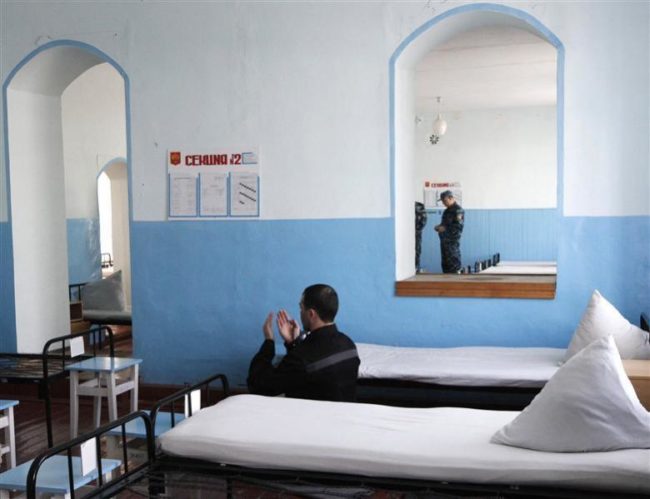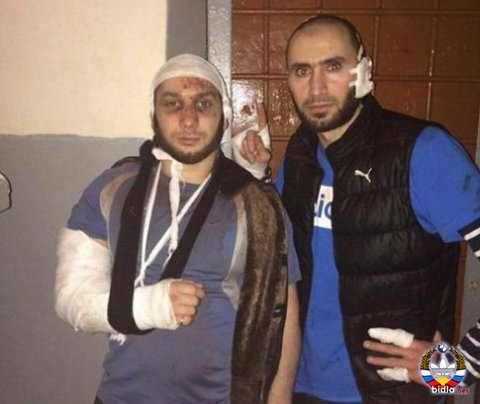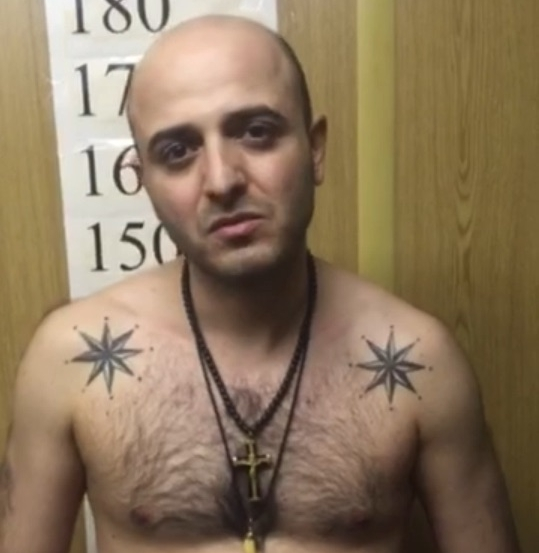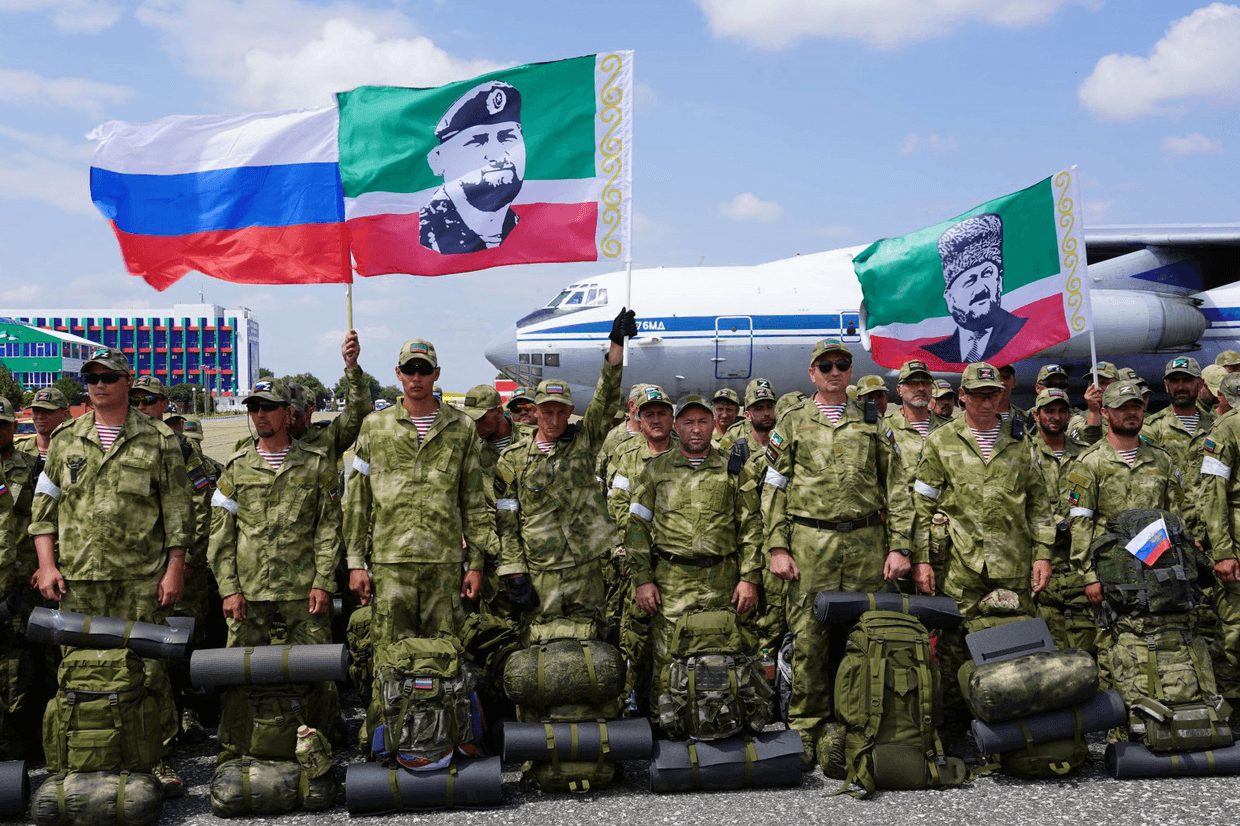

 A conflict in a Siberian penal colony between a Russian ‘thief-in-law’ and Chechen and Daghestani inmates is threatening to spiral out of control. The feud has already began to spread to other prisons in Russia, and attempts to mediate a truce between the warring factions have so far proven fruitless.
A conflict in a Siberian penal colony between a Russian ‘thief-in-law’ and Chechen and Daghestani inmates is threatening to spiral out of control. The feud has already began to spread to other prisons in Russia, and attempts to mediate a truce between the warring factions have so far proven fruitless.

The conflict began in mid-February in a penal colony in Tuva, southern Siberia; Russian ‘thief-in-law’ Ruslan ‘Shlyapa Mladshy (Hat Junior)’ Gegechkori ordered that a group of Chechens and Daghestanis be severely beaten, and the prison mosque where they performed religious rituals was destroyed. The Chechens and Daghestanis declared a blood feud against the criminal boss, and it is now doubtful that the incident will be resolved with a few apologies.
The thieves-in-law
The institution of thieves-in-law emerged in prisons throughout the entire Soviet Union in the early 20th century. A thief-in-law is a fully initiated member of the criminal underworld’s elite ruling class, who has earned their position while in prison. There is an entire subculture surrounding the thieves-in-law, including tattoos, slang, and the ponyatiya (literally: ‘the understandings’), a strict code of honour.
The incident in Tuva has already spread beyond the prison walls, instantly raising the possibility of bloodshed — between the criminals living according to the their code of honour on one side, and the offended Chechens and Daghestanis demanding satisfaction on the other.
The Chechen blood feud
It started with the kind of quarrel typical for the arrival of a new inmate; Gegechkori got into a fight with a group of Chechens. Gegechkori then ordered that a group of inmates beat-up those who had dared to challenge the 30-year-old thief-in-law. They were in the middle of performing namaz (bowing to pray) when they were attacked, and the room they had stylised as a mosque was destroyed. The prison’s administration did not intervene.
In several correctional facilities, Muslim prisoners immediately held meetings and demanded revenge on the mobster. Not even the prestige of his father, Roland ‘Shlyapa Starshy (Hat Senior)’ Gegechkori could deter the offended Caucasian Muslims, and some called for retaliation against both.
Thieves’ laws in Russia’s prisons

Aset Malsagova, a Chechen human rights worker, has visited almost every Russian prison where Chechen prisoners are held. She is very well informed about prison life and hierarchies. She thinks that the role of the thieves-in-law and their influence in Russian correctional facilities is highly exaggerated.
‘Thieves and the camp authorities most often work together, that is to say they make certain concessions to each other and their relationship mostly resembles bargaining. “Watchers” (inmates who manage other inmates) are completely incorporated into the system, and this institution has lost its significance. In the best case, they live off the obshchak (prison kitty) and keep a vigilant watch over their share. Their “immense” work during the years of my activity in this sphere was to inform me about the authorities’ abuses of power. In one case, of Khadis Gelogayev, who was killed in Karelia, I obtained information from them. When everything was confirmed, I myself approached very powerful “thieves” and they said that their laws do not work in Karelia, just like constitutional laws do not work there either. There are watchers and Chechens, but also total zeroes who also live according to the same scheme’, says Malsagova.
The Thieves’ laws, which were established and strictly enforced by thieves-in-law, ruled for a long time in Russian correctional facilities. The crime bosses shared a bond, which makes it possible for them to maintain control over a huge mass of prisoners, at times up to a million people. There are currently about 700,000 people in Russia’s prisons.
It is no secret that the intelligence services played a role in the creation of the thieves-in-law. It would be impossible for independent and principled administrators to keep such a large number of incarcerated people tranquil. Thanks to the prison bosses, wardens in many jails ignore the fact that many influential inmates enjoy the same advantages as people on the outside. In exchange, the heads of the prison’s criminal hierarchy maintain order.
Chechen prisoners’ challenge for control
However, the appearance in Russian prisons of tens of thousands of young men from the North Caucasus over the past 10–15 years , as a result of the wars in Chechnya and insurgency throughout the North Caucasus, has disrupted the old prison hierarchies. Many strictly observe Islamic traditions; holding radical views, they establish their own order in prisons, and do this with the kind of obstinacy and maximalism typical of young Caucasians.
Daniil Konstantinov, a Russian opposition political activist is convinced that Russia’s thieves-in-law are experiencing immense pressure from the Caucasian Islamists. After personally spending time in prison, he wrote about his experiences on the nationalist Russian Sector movement’s VKontakte page.
‘I observed the start and development of this conflict back when I was in detention, when everyone was talking about conflicts in the Caucasian camps, where the “greens” (Islamists) openly refused to submit to the thieves and the thieves’ ideas, building their own structure and introducing their own rules of conduct. They responded to all attempts at pressure with well-organised force, surpassing in intensity the violence of the blatniks [professional criminals who follow the ponyatiya, but have not earned the status of thief-in-law]. For example, in one of the green camps, they attacked an entire barracks of blatniks with metal bars, beating up all who were there. Then the conflict also began spreading to other camps with large Muslim contingents. Conflicts on these grounds took place in Matrosskaya Tishina, too.’
According to Malsagova, there are close to 30,000 Chechens in Russian prisons for ‘participation in an illegal armed formation’ (the charge usually levelled at militants) alone. This is not counting those convicted of regular criminal charges. Some well-known thieves-in-law have admitted in their few public interviews that while they might like the Chechens, they are not particularly favoured in prison society. The famous thief-in-law, the late Aleksandr ‘Sasha Sever’ Severny said the following of the Chechens in prison:
‘As a person, as an individual, I will say this: I greatly respected Chechens — for their dignity, for their pride. Although many did not like them so much. For all this I always admired them because they can stand up for themselves and their close ones just like that. And when this war started, I was with them heart and soul because they were defending their homeland.’
In the opinion of several former imprisoned Chechens, the latest crop of young Caucasians ‘having read a couple Islamic pamphlets’ are to blame for the worsening situation in the Tuva colony. Salaudi served a total of 14 years in prison. He says that young Chechens are trying to introduce their order very aggressively, destroying the foundations of prison coexistence.
‘There are a great many incarcerated Chechen Salafis. They collect their co-believers and constantly go around aggravating other prisoners and cellmates; they forbid smoking in the cells, the use of foul language, and other small pleasures of prison life. And their defiance is only aimed towards those in the same position as them, and never against the guards or prison authorities, who can beat them with a baton or throw them in solitary confinement.’
Time for a truce?
Rumours abound about who may or may not wade into the conflict to mediate the dispute, such as one influential thief-in-law of Chechen descent, Aziz Batukayev. According to some sources, Chechen thief-in-law Akhmed ‘Akhmed Shalinsky’ Dombayev, who is currently serving time in North Ossetia, has also been approached with this request. However, he has categorically refused to get involved.
As one former prisoner, Aslan, told OC Media, ‘Aziz can resolve this situation because he has good relations with the leadership in Chechnya. But if Ruslan Gegechkori does not publicly apologise, it is doubtful this will be closed.’






